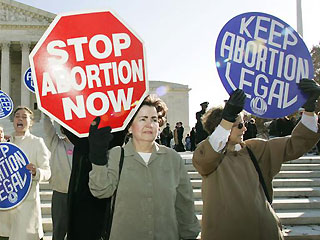 Ross Douthat points out today that late-term abortions are vanishingly rare, but says that’s part of the problem:
Ross Douthat points out today that late-term abortions are vanishingly rare, but says that’s part of the problem:
If anything, by enshrining a near-absolute right to abortion in the Constitution, the pro-choice side has ensured that the hard cases are more controversial than they otherwise would be. One reason there’s so much fierce argument about the latest of late-term abortions — Should there be a health exemption? A fetal deformity exemption? How broad should those exemptions be? — is that Americans aren’t permitted to debate anything else. Under current law, if you want to restrict abortion, post-viability procedures are the only kind you’re allowed to even regulate.
If abortion were returned to the democratic process, this landscape would change dramatically. Arguments about whether and how to restrict abortions in the second trimester — as many advanced democracies already do – would replace protests over the scope of third-trimester medical exemptions.
The result would be laws with more respect for human life, a culture less inflamed by a small number of tragic cases — and a political debate, God willing, unmarred by crimes like George Tiller’s murder.
There are a whole bunch of missing steps here. Regardless of the merits of overturning Roe v. Wade, why does Ross believe that protests over second-term abortions would be any less inflamed than protests over late-term abortions? Does he really think that if we adopted a European-style regime that banned abortion at, say, 18 weeks instead of 26, this would reduce the culture war heat that abortion breeds? I’m really not seeing the logic here.


















